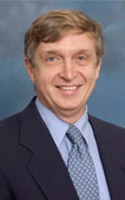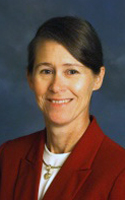Arnold faculty members among group of 112 million bloggers
April 27, 2009
There may soon be a time when a scholar who doesn’t blog, twitter or appear on podcasts, Utube and Facebook is the exception.
For the moment, however, two Arnold School faculty members have joined others in the academic world who are writing blogs and networking their thoughts and research in the rapidly growing online world.

James Hébert

Jan Probst
Dr. James Hébert, director of the USC Cancer Prevention & Control Program and Dr. Jan Probst, director of the South Carolina Rural Health Research Center are a couple of months into publishing blogs.
Both say they believe their online efforts are a wonderful new way to connect to others in the so-called “blogosphere,” which now numbers 112 million bloggers.
“We had a media consultant from the University of North Dakota come down to advise us. She said we ought to start a blog on our website and create a Facebook page for the center, said Probst.
The Office of Rural Health Policy, which funds the SCRHRC, also has insisted that agencies that it supports be more aggressive in disseminating research data.
“They’re not just interested in your going to a conference and giving a talk. They want you to push,” she said.
The blog, conceived to be a potpourri of news, opinion and gossip, is just one facet of a communications effort recommended by Wendy Opsahl, communications coordinator at the Center for Rural Health at the University of North Dakota.
“She also wants us to prepare short, five-minute videos, that can be posted on the Rural Assistance Center website,” said Probst. The website is an information portal for a wide array of rural organizations.
Probst said her blogging efforts are off to a slow start but she hopes activity to pick up as word spreads about the site. At the outset, she has tended to most of the blogging, but she adds that other members of her team may be asked to contribute thoughts and news.
Hébert, launched his blog (http://jamesrhebert.blogspot.com/) in January from India where he is spending a sabbatical semester as part of a Fulbright fellowship.
“This is a continuing story of why I wound up here in India, how I fell in love with the place, how I see India connecting to my life in South Carolina and the people I am committed to serving back home, and how I am using this sabbatical experience to pay back the very many people who have enriched my life and have boosted me up so that I can see things that I otherwise could never have even imagined,” Hébert said.
Publishing a blog is akin to keeping a journal, something Hébert has done since age five. He says writing is an integral part of the intellectual process.
“As I tell my students, humans are unique in our ability to project ourselves into the future and in our use of symbolic, written, language. Writing is thinking and until we write, we haven’t really thought very carefully or completely about our idea,” he said.
Much of what Hébert focuses on relates everyday experiences to the science and practice of epidemiology. For example, in Chapter VIII. Orthogonality, he relates the mathematical concept orthogonal (meeting at right angles) and working in his woodshop in South Carolina to the design and interpretation of results from studies in epidemiology.
Not missing the opportunity to use the inter-cultural experiences as backdrop, he also discusses scientific perspectives in relation to philosophical traditions. For example, In Chapter VI. Truth or the Water Heater, he notes that “the scientific method, in which we test whether or not something works (and the question of "how " usually transcends our experiment), is much more consistent with the Eastern view of reality in which truth is constantly being revealed.”
Hébert’s blogs are liberally illustrated with snapshots of his travels about the Indian countryside, quaint local customs and expressions of concerns for the plight of mankind.
My stark assessment, and I say this with no bitterness at all – but more a sense of sad resignation, is that the world is worse off now for the many decades of our having lived here than it was before we started.” Indeed it is the persistent and noble challenge of public health to look global problems of humanity squarely in the face and move deliberately and decisively to solve them.



_01.jpg)
_02.jpg)